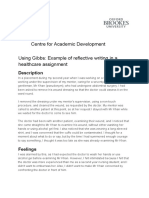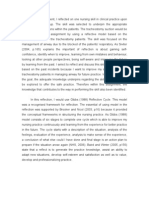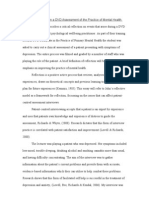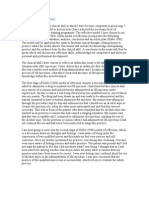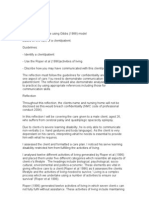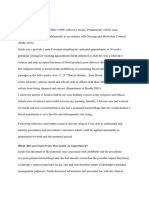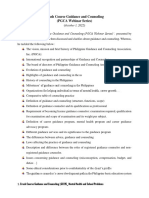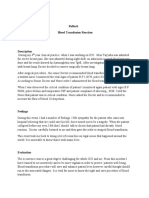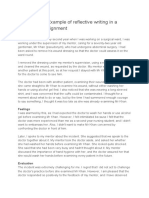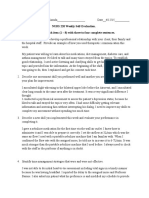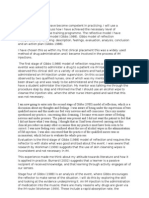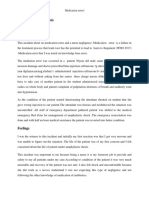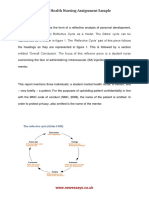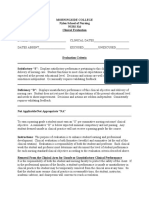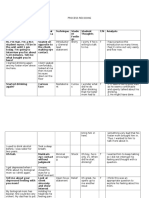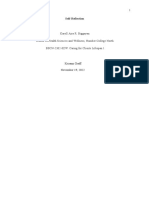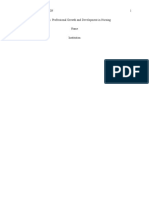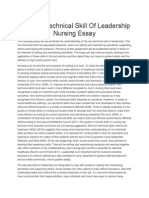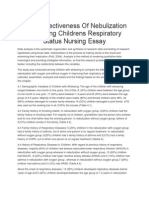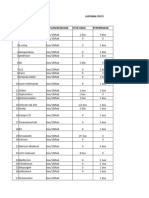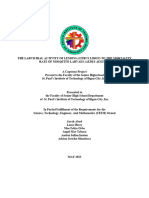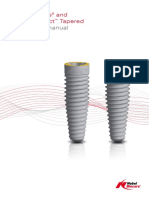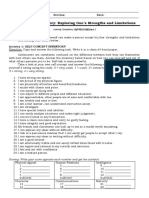100%(4)100% found this document useful (4 votes)
5K viewsPersonal Reflection On Practicing A Clinical Skill Nursing Essay
Personal Reflection On Practicing A Clinical Skill Nursing Essay
Uploaded by
NavinYattiThis document discusses a nursing student's reflection on administering an intramuscular injection according to Gibbs' reflective model. The student describes being observed giving an injection when the proper procedure of cleansing the injection site was questioned. This made the student feel nervous and confused. Upon evaluating the experience, the student realized research shows cleansing may not always be necessary if aseptic technique is followed. The reflection allowed the student to think critically about applying literature to practice.
Copyright:
© All Rights Reserved
Available Formats
Download as DOCX, PDF, TXT or read online from Scribd
Personal Reflection On Practicing A Clinical Skill Nursing Essay
Personal Reflection On Practicing A Clinical Skill Nursing Essay
Uploaded by
NavinYatti100%(4)100% found this document useful (4 votes)
5K views2 pagesThis document discusses a nursing student's reflection on administering an intramuscular injection according to Gibbs' reflective model. The student describes being observed giving an injection when the proper procedure of cleansing the injection site was questioned. This made the student feel nervous and confused. Upon evaluating the experience, the student realized research shows cleansing may not always be necessary if aseptic technique is followed. The reflection allowed the student to think critically about applying literature to practice.
Original Description:
Personal
Original Title
Personal Reflection on Practicing a Clinical Skill Nursing Essay
Copyright
© © All Rights Reserved
Available Formats
DOCX, PDF, TXT or read online from Scribd
Share this document
Did you find this document useful?
Is this content inappropriate?
This document discusses a nursing student's reflection on administering an intramuscular injection according to Gibbs' reflective model. The student describes being observed giving an injection when the proper procedure of cleansing the injection site was questioned. This made the student feel nervous and confused. Upon evaluating the experience, the student realized research shows cleansing may not always be necessary if aseptic technique is followed. The reflection allowed the student to think critically about applying literature to practice.
Copyright:
© All Rights Reserved
Available Formats
Download as DOCX, PDF, TXT or read online from Scribd
Download as docx, pdf, or txt
100%(4)100% found this document useful (4 votes)
5K views2 pagesPersonal Reflection On Practicing A Clinical Skill Nursing Essay
Personal Reflection On Practicing A Clinical Skill Nursing Essay
Uploaded by
NavinYattiThis document discusses a nursing student's reflection on administering an intramuscular injection according to Gibbs' reflective model. The student describes being observed giving an injection when the proper procedure of cleansing the injection site was questioned. This made the student feel nervous and confused. Upon evaluating the experience, the student realized research shows cleansing may not always be necessary if aseptic technique is followed. The reflection allowed the student to think critically about applying literature to practice.
Copyright:
© All Rights Reserved
Available Formats
Download as DOCX, PDF, TXT or read online from Scribd
Download as docx, pdf, or txt
You are on page 1of 2
Personal Reflection On Practicing A
Clinical Skill Nursing Essay
This essay will discuss a clinical skill in which I have become competent in practicing. I will use a
reflective model to discuss how I have achieved the necessary level of competence in my nurse
training programme. The reflective model I have chosen to use is Gibbs model (Gibbs 1988). Gibbs
model of reflection incorporates the following: description, feelings, evaluation, analysis, conclusion
and an action plan (Gibbs 1988). The model will be applied to the essay to facilitate critical thought,
relating theory to practice where the model allows. Discussion will include the knowledge
underpinning practice and the evidence base for the clinical skill. A conclusion to the essay will then
be given which will discuss my reflection skills, acknowledge my competence and show my personal
and professional development.
The clinical skill I have chosen to reflect on within this essay is the administration of Intramuscular
(IM) injections. I have chosen this as within my first clinical placement this was a widely used method
of drug administration and I became involved in the process of IM injections. I therefore researched
the topic of IM injections and my knowledge within this area developed.
The first stage of Gibbs (1988) model of reflection requires a description of events. I was asked to
administer a drug to a patient via IM injection. I had observed this clinical skill on a variety of
occasions and had previously administered an IM injection under supervision. On this occasion I
was being observed by two qualified nurses, one of which was my mentor. The drug had been
drawn up and was ready to be administered and the patient consented to have a student administer
the injection. My mentor was talking me through the procedure step by step and informed me that I
should use an alcohol wipe to cleanse the injection site, when the other nurse interrupted and said
that this was not necessary. This was in front of the patient, who then requested that the alcohol
wipe was omitted as on previous occasions this had caused a stinging sensation. My mentor said
that this was acceptable and I continued to administer the injection, omitting the use of the alcohol
wipe. On the previous occasions when I had administered IM injections I had not cleansed the site
and had never been instructed to adopt this practice.
I am now going to enter into the second stage of Gibbs (1988) model of reflection, which is a
discussion about my thoughts and feelings. I was aware of being under the supervision of two
qualified nurses and this made me feel very nervous and self conscious. Once my mentor
questioned my practice, concerning skin cleansing, I became even more aware of feeling nervous
and under pressure. The patient was present and I did not want the patient to feel that I did not know
what I was doing. I thought that as I had been observed carrying out this clinical procedure on many
other occasions then my practice must have been seen to be correct. I was now feeling very
confused about the use of alcohol wipes in the administration of IM injection. I was also concerned
that the practice of the qualified nurses was so inconsistent, which led me to evaluate the whole
process.
Evaluation is the third stage of Gibbs (1988) model of reflection and requires the reflector to with
state what was good and bad about the event. I was aware that research by Workman (1999)
suggests that the use of skin cleansing wipes is inconsistent and not necessary in IM injections if the
patient appears to be physically clean and an aseptic technique is adopted, along with stringent
hand washing by the nurse. It has also been noted that the use of cleansing with an alcohol wipe
can cause skin hardening (Mallet & Dougherty 2000). The trust policy was to follow guidelines
published by the Royal Marsden Hospital (Mallet & Dougherty 2000). The Royal Marsden (Mallet &
Dougherty 2000) advocate the use of skin cleansing wipes, however it is stated within their
guidelines that they adopt this because their patients are often immunocompromised, and give
evidence of previous studies which indicate that skin cleansing is not normally necessary. Therefore
my practice was within the trust protocol. This experience made me think about my attitude towards
literature and how it is applied in practice. Burnard (2002) suggests that a learner is a passive
recipient of received knowledge, and that learning through activity engages all of our senses.
You might also like
- Gibbs ExampleDocument7 pagesGibbs ExampleAdelaine Dalang-Ano95% (21)
- Reflective EssayDocument4 pagesReflective EssayJustin Shene Manuel75% (8)
- Gibbs Model of The Reflective CycleDocument2 pagesGibbs Model of The Reflective CycleFrancis Obmerga92% (12)
- Using Gibbs Example of Reflective Writing in A Healthcare AssignmentDocument3 pagesUsing Gibbs Example of Reflective Writing in A Healthcare AssignmentM Asif Nawaz100% (3)
- Reflective Essay Year 2Document16 pagesReflective Essay Year 2miss tinkerbella91% (98)
- Reflective SkillDocument9 pagesReflective Skillmiss tinkerbella83% (6)
- Reflective Essay Draft 2Document5 pagesReflective Essay Draft 2Nancy Evans67% (3)
- I Will Use The Gibbs Model Which Incorporates The FollowingDocument21 pagesI Will Use The Gibbs Model Which Incorporates The FollowingNiamh_O_Shea_631869% (13)
- Reflection On A Clinical SkillDocument3 pagesReflection On A Clinical Skillekwonna100% (3)
- Clinical Reflective Practice On Critical IncidentDocument11 pagesClinical Reflective Practice On Critical IncidentAkula Dia100% (8)
- 1st Week ReflectionDocument2 pages1st Week Reflectionacharyaamrit07No ratings yet
- Time Management Reflective LogDocument4 pagesTime Management Reflective Logfazal rahmanNo ratings yet
- ReflectionDocument11 pagesReflectionSarahJane100% (1)
- Response BlockingDocument3 pagesResponse Blockingiulia9gavris50% (2)
- Scenario 2. ReflectionDocument5 pagesScenario 2. ReflectionShafiq Ur Rahman50% (2)
- Reflective Account of Nursing1Document33 pagesReflective Account of Nursing1Min Yem92% (12)
- Reflective Essay Using Gibbs ModelDocument9 pagesReflective Essay Using Gibbs Modeljoseph nga'ng'ah100% (5)
- Reflection On Practice Using Gibbs (1988) ModelDocument5 pagesReflection On Practice Using Gibbs (1988) Modelohboyism75% (4)
- Essay Using Gibbs WDocument5 pagesEssay Using Gibbs WJocelinda Avelina100% (3)
- Bio-Medical Waste ManagementDocument38 pagesBio-Medical Waste Managementabhishek80% (5)
- Crash Course Guidance and Counseling (PGCA Webinar Series)Document21 pagesCrash Course Guidance and Counseling (PGCA Webinar Series)Cherry Ann De VeraNo ratings yet
- Reflection On Blood Transfusion ErrorDocument3 pagesReflection On Blood Transfusion ErrorSana LaraibNo ratings yet
- Written Assignment: Reflective WritingDocument9 pagesWritten Assignment: Reflective WritingNur Aziemah Mohd Zamri100% (1)
- Ella Reflection Essay - Complete-1Document10 pagesElla Reflection Essay - Complete-1ella grindellNo ratings yet
- Using Gibbs - Example of Reflective Writing in A Healthcare AssignmentDocument3 pagesUsing Gibbs - Example of Reflective Writing in A Healthcare AssignmentNada100% (2)
- Nicola Bray Reflective PracticeDocument10 pagesNicola Bray Reflective Practicenikkib87100% (3)
- Clinical ReflectionDocument3 pagesClinical ReflectionNaomi MasudaNo ratings yet
- Reflective AssignmentDocument5 pagesReflective AssignmentVictor Murambiwa100% (4)
- Gibbs Reflective Journal SampleDocument4 pagesGibbs Reflective Journal SampleCres Padua Quinzon100% (3)
- Acute Care Final Reflective Journal 2018Document3 pagesAcute Care Final Reflective Journal 2018api-423090662No ratings yet
- Gibb's Reflective Cycle: DescriptionDocument3 pagesGibb's Reflective Cycle: DescriptionLarr Sumalpong100% (1)
- Reflective Practice in Nursing - Saw. Final2Document20 pagesReflective Practice in Nursing - Saw. Final2Anonymous HK3LyOqR2g100% (2)
- Reflection Has Become An Important Concept in Nursing Nursing EssayDocument3 pagesReflection Has Become An Important Concept in Nursing Nursing EssayNavinYatti100% (1)
- Student Reflective ExampleDocument8 pagesStudent Reflective ExampleGongju EsyaNo ratings yet
- Reflective JournalDocument8 pagesReflective Journalapi-486025324100% (2)
- (CUENCA) GIBBS Reflective Cycle Community Health Nursing Week 1Document3 pages(CUENCA) GIBBS Reflective Cycle Community Health Nursing Week 1Tom Cuenca0% (1)
- Critical Incident AnalysisDocument5 pagesCritical Incident Analysiszaim tech60% (5)
- Nursing Assignment Sample On Case Study On DementiaDocument12 pagesNursing Assignment Sample On Case Study On DementiaAssignment Essay Help100% (1)
- Writing Better Reflective Practice Essays in NursingDocument19 pagesWriting Better Reflective Practice Essays in NursingMiu MiuNo ratings yet
- Reflection Has Become An Important Concept in Nursing Nursing EssayDocument3 pagesReflection Has Become An Important Concept in Nursing Nursing EssayNavinYatti100% (1)
- Case Study of An Ethical DilemmaDocument3 pagesCase Study of An Ethical DilemmaNavinYatti0% (1)
- Planning & Organizing A Hospital, Unit & Ancillary ServicesDocument31 pagesPlanning & Organizing A Hospital, Unit & Ancillary ServicesSimon Josan100% (4)
- 100 Bedded Hospital PDFDocument14 pages100 Bedded Hospital PDFGauri Singhal50% (2)
- RIS 7016 INS Iss 1 2Document87 pagesRIS 7016 INS Iss 1 2Anil Kumar100% (1)
- Sermorelin Main InformationDocument4 pagesSermorelin Main InformationPedro MolinaNo ratings yet
- Reflective JournalDocument8 pagesReflective JournalParveen KumariNo ratings yet
- Reflection On A Night Shift in Emergency and TraumaDocument7 pagesReflection On A Night Shift in Emergency and Traumasjamilmdfauzie100% (1)
- Mental Health Nursing Assignment Sample: WWW - Newessays.co - UkDocument15 pagesMental Health Nursing Assignment Sample: WWW - Newessays.co - UkAriadne MangondatoNo ratings yet
- Nursing HandoverDocument7 pagesNursing Handoverpros_86850% (2)
- 1st Week ReflectionDocument2 pages1st Week Reflectionacharyaamrit0780% (5)
- Arjun Kumar CIADocument3 pagesArjun Kumar CIAasimNo ratings yet
- Personal Reflection - e PortfolioDocument4 pagesPersonal Reflection - e Portfolioapi-275863567100% (1)
- Reflective Paper..Document13 pagesReflective Paper..joseph nga'ng'ahNo ratings yet
- Reflective Writing For Nursing and Midwifery Tip Sheet S220Document9 pagesReflective Writing For Nursing and Midwifery Tip Sheet S220p-679747No ratings yet
- Reflective Writing 2Document4 pagesReflective Writing 2dileepkumar.duhs4817No ratings yet
- Critical Incidence On A Paediatric WardDocument6 pagesCritical Incidence On A Paediatric Wardleinadsiloh100% (1)
- BACHELOR IN NURSING - Docx (Reflection)Document9 pagesBACHELOR IN NURSING - Docx (Reflection)siti husniNo ratings yet
- Sample Essay F5000FDDocument7 pagesSample Essay F5000FDAyshaNo ratings yet
- ReflectionDocument2 pagesReflectionapi-283689862No ratings yet
- Critical Reflection1Document6 pagesCritical Reflection1api-313097878No ratings yet
- Final Reflection DkropaczekDocument3 pagesFinal Reflection Dkropaczekapi-294937204No ratings yet
- Nursing ReflectionDocument5 pagesNursing Reflectionvrunda patel100% (1)
- Nursing Reflection 3Document4 pagesNursing Reflection 3Natasha Nicole100% (2)
- 360 Process RecordingDocument11 pages360 Process Recordingapi-34006085780% (5)
- Reflective Theories Final DraftDocument9 pagesReflective Theories Final Draftapi-582461022No ratings yet
- Karyll Reflection 2Document5 pagesKaryll Reflection 2Karyll BiggayanNo ratings yet
- J#203175433 NursingDocument14 pagesJ#203175433 Nursingkarani mikeNo ratings yet
- Reflective Writing Exercise - Ally 100Document7 pagesReflective Writing Exercise - Ally 100krishNo ratings yet
- Running Head: Practicing Nurse Self-ReflectionDocument9 pagesRunning Head: Practicing Nurse Self-ReflectionMorgan OkothNo ratings yet
- SQL - CH 12 - Creating A DatabaseDocument9 pagesSQL - CH 12 - Creating A DatabaseNavinYattiNo ratings yet
- The Non Technical Skill of Leadership Nursing EssayDocument3 pagesThe Non Technical Skill of Leadership Nursing EssayNavinYattiNo ratings yet
- The Prohibition of Euthanasia Nursing EssayDocument2 pagesThe Prohibition of Euthanasia Nursing EssayNavinYattiNo ratings yet
- Study Effectiveness of Nebulization Improving Childrens Respiratory Status Nursing EssayDocument2 pagesStudy Effectiveness of Nebulization Improving Childrens Respiratory Status Nursing EssayNavinYattiNo ratings yet
- Sample Coursework: (1) What Is Plagiarism?Document2 pagesSample Coursework: (1) What Is Plagiarism?NavinYattiNo ratings yet
- Meetings With Project MentorDocument3 pagesMeetings With Project MentorNavinYattiNo ratings yet
- PD Program Was Successful in Hong KongDocument2 pagesPD Program Was Successful in Hong KongNavinYattiNo ratings yet
- Journey Through Criminal Justice Systems Law EssayDocument2 pagesJourney Through Criminal Justice Systems Law EssayNavinYattiNo ratings yet
- Mental Capacity ActDocument1 pageMental Capacity ActNavinYattiNo ratings yet
- Discussion of Management For Hip Replacement Surgery Patients Nursing EssayDocument2 pagesDiscussion of Management For Hip Replacement Surgery Patients Nursing EssayNavinYattiNo ratings yet
- Case Study and History of HypertensionDocument2 pagesCase Study and History of HypertensionNavinYatti100% (1)
- Circumcision: Event Proper For Patients Meeting With The Lgus Creating ConceptDocument1 pageCircumcision: Event Proper For Patients Meeting With The Lgus Creating Conceptvane rondinaNo ratings yet
- Safety Data Sheet: Product Name: PAVING BITUMEN 60/70 AFDocument10 pagesSafety Data Sheet: Product Name: PAVING BITUMEN 60/70 AFmohamed saadNo ratings yet
- Philips M1165/66/67/75/76/77A CMS Patient Monitoring System and Philips M1205A V24 and V26 Patient MonitorDocument282 pagesPhilips M1165/66/67/75/76/77A CMS Patient Monitoring System and Philips M1205A V24 and V26 Patient MonitorKuni KazeNo ratings yet
- KRYLON® Battery Protector - Sherwin-Williams CoDocument18 pagesKRYLON® Battery Protector - Sherwin-Williams Comddimond1983No ratings yet
- Grade3 Air Pollution ProjectDocument7 pagesGrade3 Air Pollution ProjectA'liyahNo ratings yet
- Interview Questions and AnswersDocument7 pagesInterview Questions and Answerskallababurao51100% (1)
- Laporan Obat Desa TPUDocument8 pagesLaporan Obat Desa TPUElisya SyawiNo ratings yet
- Management Hyperglycemic CrisesDocument49 pagesManagement Hyperglycemic Crisessheryl yangNo ratings yet
- AgniDocument2 pagesAgniTarun MotlaNo ratings yet
- Module 4 PerdevDocument4 pagesModule 4 Perdevkyleedator1706No ratings yet
- OET Ultimate Writing GuideDocument30 pagesOET Ultimate Writing GuideAhmed GülNo ratings yet
- Martinez Et Al 2017Document14 pagesMartinez Et Al 2017Adrian Melgratti JobsonNo ratings yet
- Prayers and Mantras To Pacify The Spread of Disease.2020.03.08Document4 pagesPrayers and Mantras To Pacify The Spread of Disease.2020.03.08mozollis22100% (1)
- ABEn163 - Boca Lab Exer No.3Document4 pagesABEn163 - Boca Lab Exer No.3Jhe SsaNo ratings yet
- Patient Consent Form TemplateDocument2 pagesPatient Consent Form TemplatePremchandra GuptaNo ratings yet
- Research May 4 2022 Lemon ExtractDocument41 pagesResearch May 4 2022 Lemon ExtractkunohoshiNo ratings yet
- SEMINAR EngleskiDocument12 pagesSEMINAR Engleskisimo vasovicNo ratings yet
- 75434G - NoblRep&Rep Sel Tap Manual 13.1 - GBDocument64 pages75434G - NoblRep&Rep Sel Tap Manual 13.1 - GBkaizeNo ratings yet
- 1 - Self-Concept InventoryDocument4 pages1 - Self-Concept InventoryApril Joy LascuñaNo ratings yet
- UN B. Inggris-2009Document13 pagesUN B. Inggris-2009fitriNo ratings yet
- Telangana Ehs HospitalsDocument9 pagesTelangana Ehs HospitalsAkbar MohammedNo ratings yet
- MJV2Document2 pagesMJV2Mervin BocatcatNo ratings yet
- Narayana Health Care - MainDocument19 pagesNarayana Health Care - MainNeeraj GargNo ratings yet



